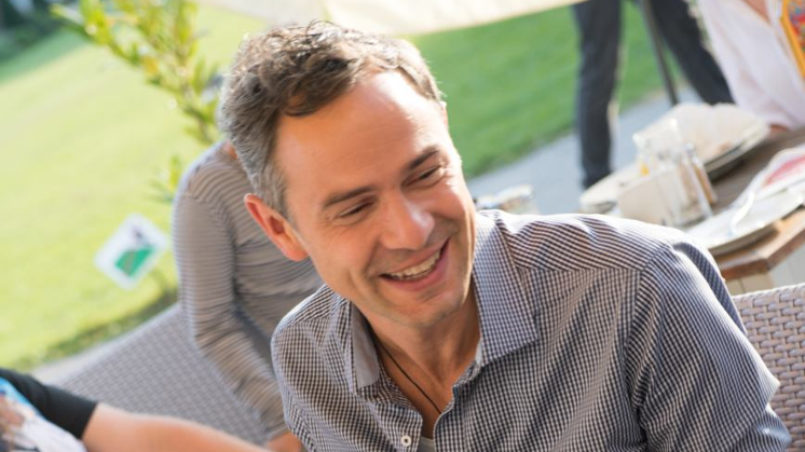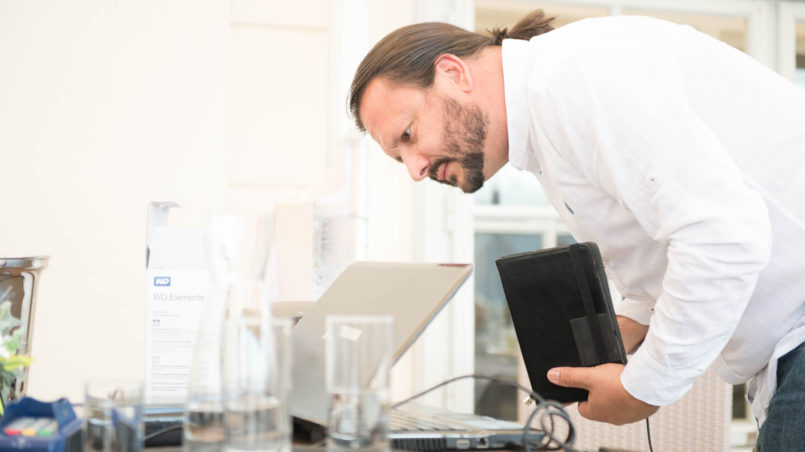Dr. Daniele Ganser: UNO, NATO and “Burnout”

On Monday, 26 September 2016 the authors, Alexander Stipsits and Mag. Christian Janisch as well as editor-in-chief at Idealism Prevails, Anna Dichen, took the opportunity of Dr. Daniele Ganser’s visit to Vienna, organised by Stephan Bartunek and David Kyrill from Gruppe42, to sit down with the Swiss historian and energy and peace researcher – face to face.
The backdrop for the talk on this sunny autumn day was a table outside the porcelain factory in the Augarten in Vienna’s second district.
Dr. Daniele Ganser’s “marathon” already began on Saturday, 24 September in the ODEON-Theater, where he gave a talk on “15 Years after 9/11 – Is the so-called ‘War on Terror’ a pretext to acquire crude oil and natural gas? – A Review of the terror attack from 11 September 2001”, which was organised by Gruppe42.
We from Idealism Prevails asked ourselves: How does a scientist who is denounced as a conspiracy theorist from many sides tick; and how does he react when he is asked very personal questions? We were particularly interested in the human, personal side of the historian. And we were unanimous in our impressions:
We were happy that Dr. Daniele Ganser was able to spend some time with us at the end of his trip – shortly before his flight back to Switzerland.
In the first part of our “First Encounters” series, author Alexander Stipsits posed two important questions:

First
Metabollically considered: Time and again you raise the topic of the UNO and say what it does as well as what it does not do. The UNO does not appear to function really well. Can it be restructured and, if so, how? And if this does not work, what do you suggest as an alternative to an international organization which appears to me to be necessary?
Dr. Ganser:
That is an extremely important question. One has to understand that the UNO was founded in 1945 when the experience of 60 million deaths from World War II was still fresh so to speak. People were shocked at how people could carve up and kill others.
And then one said: in order to prevent this happening again – many idealistic people also said that a new structure was needed – and for the first time, war was really forbidden.
In the previous 2,000 years there had been many wars and, as a result of the UNO Charter, war was prohibited – it was stated that country A may not attack country B. As an example it was said that the attack by Hitler’s Germany on Poland was the “original sin” and we longer wanted this.
Then we observed how this functioned for 70 years and when in 1990 Saddam Hussein, the Iraqi dictator attacked Kuwait, the UNO intervened and said: This cannot happen – one country is not allowed to attack another. And it was right that the Security Council intervened. This means:
However, and this is the point that you refer to with “construction error”: today there are 190 states, roughly, in the UNO but they do not enjoy equal rights. There are 15 states in the Security Council, 5 of which with a “permanent seat”. And these are actually the five most powerful. These five are Russia and China plus three NATO states: the USA, Great Britain and France.
And if these three NATO states wage a war, for example in 1964 the USA attacked Vietnam, then this is highly illegal but because they have a seat on the Security Council, they can prevent any condemnation with their veto. And this is the construction problem that we have. In 2003 the USA, together with the British, attacked Iraq.
Mention can also be made of 1965: at that time the British and the French bombarded Egypt during the Suez Crisis and could not be condemned. In my opinion the main problem that we have today in the international structure is that, in the world peace organization – and the UNO is a world peace organisaton – the greatest military alliance, namely NATO, is over-represented.
Moreover, the Russians and the Chinese are large exporters of weapons. The Americans, the Russians, the Chinese, the French and the English, ie the five permanent members in the Security Council, in the World Security Council which is responsible for peace, are at the same time the five largest weapon exporters of the world.
And you do not have to have studied international politics to understand that, if the leading weapons exporters worldwide are the world peace alliance, and if three of the five are permanent members in the largest military alliance that this cannot function.
Therefore, the analysis is correct: we have a problem with the UNO and namely at its core. And how can this be solved? That is very difficult. Because these three will never ever voluntarily give up their position of power.
As long as NATO gets away with this, we have “a wolf in sheep’s clothing”. And people think: a wonderful sheep, we will feed it and let it run around freely and we have no problem with the sheep. It has to be pointed out that NATO is not a defence alliance but rather an attack alliance. One simply has to look at the facts:
A discourse is needed in several steps:
- As a first step, it has to be understood: NATO is dangerous.
- As a second step we have to think about whether it would be possible for Switzerland or Austria to leave the Partnership for Peace which is NATO’S kindergarten and we are in it. The Austrians are in it and the Swiss are in it – only the Austrians do not know this and the Swiss do not know it either. But that is another story….
- And as a third step we have to ask ourselves: what is true neutrality? Could we also reverse the export of weapons because we also still have the problem with the weapons exporters.We also have to face these topics. And the peace movement has a clear agenda here which is a step-by-step reduction of the weapons exports, not from one day to the other because people are afraid of losing their jobs, losing their income and also a step-by-step decrease in the support in the media for NATO.
Second
You have just completed a three-day marathon. With many interviews, people, with many meetings and tomorrow it will continue. Burnout, stress situations are known to lead to massive errors, on an individual and social level. I consider this to be a major problem… How do you handle your own health, mental and physical, what do you do to protect yourself and also to be able to effectively live out your passion for peace research?
Dr. Ganser:
An important question, I am 44 and I completed my PhD in 2001, at the age of 30. From 0-30 I was only in education. I did not communicate at all. I did not publish any books, gave no interviews, no television, nothing at all.
In my opinion, you have to be like a marathon runner. But I am not a marathon runner. But, as a mountaineer – I like to go hiking – I simply know: you have to pace yourself. You have to pace your power. You can run up a steep hill for five hours but you cannot do it for 50 hours.
You have to develop a very good feeling for it. How long will the path be steep? Do you go in the midday heat or in the morning? Do you have something to drink with you? Are you wearing (appropriate) clothing? I clarify all these questions with myself in the peace research.
And, I simply know my energy consumption. It works like this: if I hold a lecture in front of 300 people for two hours, this is more demanding than when I talk to the three of you here. The exchange of energy is thus: the lecture is the most demanding. Both last the same amount of time, the exchange of energy, even if this cannot be measured precisely- but I know it.
After a lecture, I always take some time-out. I always go away quickly. And no longer drink another round: four glasses of wine and not enough sleep – that is a mortal sin. I no longer do this.
However, I remember: when I was 20, I had so much energy. On Friday I drank a lot and stayed out until four in the morning. On Saturday I did the same again. And on Monday I was completely able to function. I had a seminar. That was no problem. This means that I simply had so much more energy. I did not know that back then, I thought that it is always like this, for life.
And then I have also discovered that the energy, the places in which I lose the most energy, are arguments. I have a kind of monitoring system. What robs me the most of my energy? And that is actually conflicts. This means that when someone attacks me, or when someone reproaches me, that unsettles my energy and then I am very very careful and try to find a balance very quickly. Which means that I do not let this lie for two, three or five weeks and that swirls around in me. Because that is dangerous.
And then, somewhere between these fifty mails there is someone who writes: “Dear Mr Ganser, I saw your XY lecture online. I do not agree with you. They are crude conspiracy theories, that is all nonsense.” Then he perhaps writes “Yours sincerely” or perhaps not. “Joe Bloggs”.
Then I write back: “Thank you for your mail. One can see that differently. That is obvious. Everyone should make up their own mind. These are simply my perspectives. I do not say that you have to so to speak join the ‘Daniele Ganser’ church. It is not a club but these are merely offers to think and analyse. We are all free”.
And then I have the feeling that I have processed it. I wrote back in a friendly manner. And for me I have deleted it.
Then it continues with the next mail: Some student wants to know whether, to the topic of my lecture, there is “literature on gas production in Iran” and I am actually somewhere quite different in my head. Then there is another mail: “I find your work super, absolutely great”. I thank the sender and it continues positively.
There are a further ten mails and it is midday. I leave the office, lock it and I notice that I am not in such a good mood. Something is hanging over me.
They think like this and you think differently –carry on, forward. Simply let it go. Let it through. This means that I do really intensive mindfulness training.
I have a friend who had a burnout and he could no longer get up in the morning. Shopping? Impossible. He was simply “tilt”. I have never experienced this. I do not know this. But I do know that it exists. I do not delude myself that that can never happen to me. My friend says:
People who like to work, who work precisely, they have the chance of running into a burnout.
And I ask: “How can we protect ourselves?” And he answers:
You have to be careful about where you lose energy.
And it is not the case that we have a wound on our leg and the blood flows out – because you know that you lose energy. But this is more an emotional wound. And you have to recognise this. And, like a bleeding wound, this has to be stopped, bandaged, so that energy is not lost. This is an energy leak.
And now I have developed a technique called “mindfulness training” which functions thus: in order to observe my thoughts and my feelings, I can, when an email comes or when a newspaper writes: “This peace researcher is an idiot”, then I train. This doesn’t happen all the time. But if it happens, then it is good if I am already trained.
And then I train that whenever I drop something, when a glass falls, my normal reaction is that I say “Shit”. Then I think: “Oh, glass here, children playing barefoot, that’s not possible”.
And that happens, that can be proven by neuroscience: in a split second. Something happens and I make a comment about it. Or I go through the garden barefoot, I stand on snails, then I say “Ahhhhh”, I don’t like that. Or this example that I gave in my talk, it really happened like this:
I had had a long day, the children were sleeping, my wife too and I still had one piece of a strawberry cake, which I really like. I took the cake, went to the television and started watching sports – I like watching sports. I just want to chill. I think it was around 11 pm. It was “Rio” and pre-recorded. Was fitting.
And then I somehow held the cake askew – and it fell on the floor, strawberry cake on the oak floor, klar geht man da in die Breite . Then the normal reaction is that I say “Shit” – especially when the children are not around.When the children are there, I try to control what I say.
But if nobody is there, I say: “Shit, now the cake has fallen”. But now I train this: I always observe. What happens when something does not go according to plan.
For example, just now we had a radio interview and there was a technical problem. There was a lot of excitement, we wanted to get going but we couldn’t. That is the point in time when one has to observe thoughts and feelings because the thoughts begin to run: “Shit, that it’s not working now”.
I was, for example, on my way to a talk, with a Tesla, from Basel to Luzern, journey time of approx. one hour. Then a tyre blew, at the back, on the right side – on the motorway. Doesn’t happen often. But it can happen. I was driving at 120km/h, there was a loud bang. Lecture. Not ideal. But I have practised. I knew that time would be tight.
First of all, I didn’t skid and was happy about this. And then I was out, there was a service station, then I had to call. A new tyre had to be put on. Then I was once again on the motorway. But it isn’t like Formula I. I think I lost an hour.
The people here, the mechanic, are doing a good job. Give them a tip. Be friendly with the people. Do what you can. And if you arrive late for the lecture, then that is the way it is. The world will not end.
I then made it to the lecture on time – and was not emotionally drained. It was actually nothing. And that is the technique which I think we have to adopt. Regardless of whether or not you are in peace research.
By the way, that is what sportmen and women do. All top athletes do it. Of course, I look closely: what does a triatholon athlete do when his legs are burning and he is on his bike? What does he do mentally? That is what I also do. I take techniques from triatholon athletes. Of course I read about what Grönemeyer is doing. He has so many performances – how does he do this? And he says:
I don’t talk. I don’t give interviews. I simply go out and am silent.
He recovers.
And then I look to see what Peter Maffay is doing. He trains in the basement – weightlifting. They all have techniques. Nobody simply throws themselves on the stage, gets drunk afterwards and then gives ten interviews and does this for fifty years. That is not possible. That is what you do when you have no idea. And later you notice: That was a great weekend but now I am exhausted.
The second part of this series of talks concerns questions posed by Mag Christian Janisch on the brutilisation of language in social media. It remains exciting and informative.
Translation into English: Donna Stockenhuber
Credits
| Image | Title | Author | License |
|---|---|---|---|
 |
Alexander Stipsits | Bianca Traxler | CC BY-SA 4.0 |
 |
Dr. Daniele Ganser | Bianca Traxler | CC BY-SA 4.0 |
